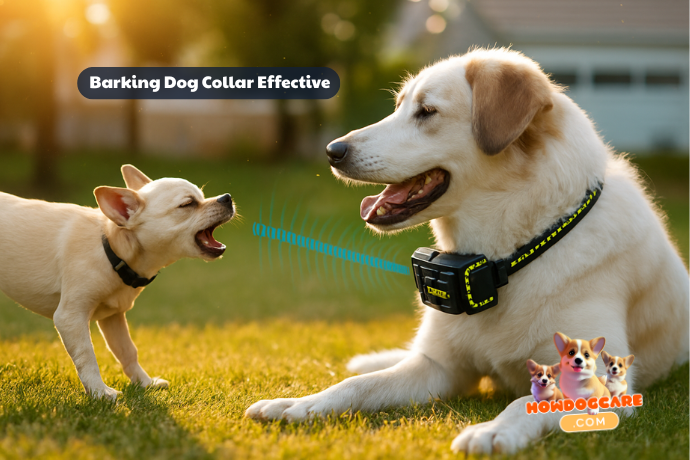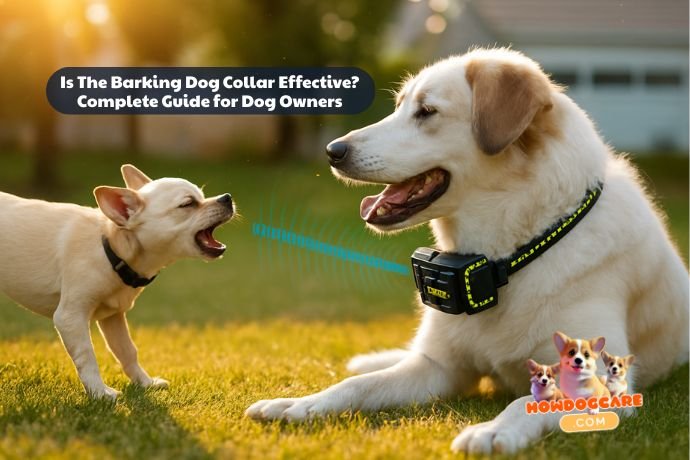If you’ve ever wondered, “Is a barking dog collar effective?” you’re not alone. Bark collars, also known as anti-bark collars or bark stop collars, are commonly discussed tools for addressing excessive barking. However, opinions about their use are often divided. In this detailed guide, we break down how barking collars work, why dogs bark, and whether this tool is right for your dog.
Why Do Dogs Bark Excessively?
Understanding the root cause of barking is the first step before asking, “Are barking dog collars effective?”
Common Reasons Why Dogs Bark
Dogs bark for a variety of reasons, including communication, attention-seeking, and natural instincts. Barking is part of how dogs express emotions and interact with their environment. Here are common triggers:
- Communication with other dogs: Barking is their vocal language, alongside scent communication.
- Warning of danger: Dogs often bark at unfamiliar animals or people near their territory.
- Attention-seeking behavior: Dogs may bark when they feel lonely, hungry, anxious, or stressed.
- Boredom: Without enough physical and mental stimulation, dogs bark to release energy.
- Environmental factors: Strange sounds, sights, or scents can provoke barking.
Why Excessive Barking Is a Problem
While barking is natural, uncontrolled barking—especially in apartments or crowded neighborhoods—can become a serious nuisance. Excessive barking may strain relationships with neighbors and create stress for both the dog and the owner.
(*) Top 5 Best Dog Bath Tub Large By Flying Pig Grooming Brand
(**) Top 6 Best Small Dog Grooming Table Reviews
(***) Top 10 Best Dog Collars Reviews (Updated Guide)
What Is a Barking Dog Collar and How Does It Work?
If you’re searching for solutions to stop barking, you’ve likely asked, “How effective is a barking dog collar?” Let’s explore how they function.
Understanding the Barking Dog Collar
A barking dog collar is designed to discourage barking through gentle correction. These collars often include the following mechanisms:
- Sound sensors: Detect barking through sound or vibrations.
- Correction methods: Emit a vibration, sound, citronella spray, or static stimulation when barking is detected.
How Does the Barking Dog Collar Work?
- When your dog barks, the collar detects the sound or vibration.
- It then triggers a mild stimulus (sound, vibration, or static).
- This distracts your dog and interrupts the barking behavior.
- Over time, dogs associate barking with the unpleasant correction and reduce the behavior.
Are Barking Dog Collars Safe?
Yes, when used correctly. The stimulation levels are adjustable and designed within safety limits for pets. Modern collars ensure that:
- Stimulations are mild and humane.
- Sounds or vibrations are only noticeable to the dog wearing the collar.
- Automatic shut-offs prevent overcorrection.
Is the Barking Dog Collar Effective for Training?

Benefits of Using a Barking Dog Collar
- Fast results: Some dogs reduce barking within 2-3 days of consistent use.
- Humane correction: Proper collars do not harm dogs but serve as effective training tools.
- Behavior improvement: Helps dogs distinguish between necessary and unnecessary barking.
When to Consider a Barking Collar
- Your dog barks excessively without valid reasons.
- Traditional training techniques have failed.
- You live in noise-sensitive environments (apartments, close neighbors).
- Safety is a concern when barking escalates aggression.
Important Tips When Using a Barking Dog Collar
Even though barking collars can be effective, responsible usage is key to success.
Usage Guidelines for Best Results
- Limit Usage: Do not use the collar for more than 12 hours per day.
- Monitor Fit: Ensure proper fit to avoid discomfort or skin irritation.
- Supervise Initial Use: Always observe your dog’s reaction during the first few days.
- Adjust Sensitivity: Tailor the sensitivity to your dog’s barking level and personality.
When Not to Use a Barking Collar
Avoid using anti-bark collars in these situations:
- Aggressive dogs: Could worsen their behavior.
- Sick or pregnant dogs: Health risks outweigh benefits.
- Puppies under 6 months: Still learning basic behaviors.
- Water activities: Even waterproof collars should be removed before swimming.
Common Mistakes to Avoid with Barking Dog Collars
- Leaving the collar on too long without breaks.
- Using the highest correction level unnecessarily.
- Not pairing the collar with positive reinforcement (treats, praise).
- Using it as a punishment rather than a training tool.
Pros and Cons of Barking Dog Collars
Advantages
- Quick results in many cases.
- Safe and humane when used correctly.
- Adjustable settings for sensitivity and correction type.
- Helps reduce neighborhood noise complaints.
Disadvantages
- Not suitable for every dog (especially aggressive or fearful dogs).
- Improper use can cause anxiety or confusion.
- Requires responsible supervision and training knowledge.
(a) Ultimate Guide to Choosing the Best Dog Bark Collar with Remote
(b) Best Ultrasonic Dog Bark Control Devices Reviews
(c) Top 19 Best GPS Dog Tracker Collars Reviews
Conclusion: Is the Barking Dog Collar Effective?
The barking dog collar is effective for many dogs when used properly, especially for curbing unnecessary barking behaviors. It’s not a one-size-fits-all solution, but with responsible use and proper training, it can help create a calmer, quieter environment for you and your pet.
If you’re considering this tool, remember:
- Use it as a supplement to training, not a replacement.
- Choose the right type of collar based on your dog’s size and temperament.
- Prioritize your dog’s safety and comfort at all times.
Frequently Asked Questions (FAQs)
1. Can barking dog collars hurt my dog?
No, modern collars are designed to deliver mild, harmless correction. However, misuse can cause anxiety, so follow usage guidelines carefully.
2. How long does it take for a barking dog collar to work?
Many owners see results within 2-3 days, but it depends on the dog’s personality and the consistency of use.
3. Are barking collars better than professional training?
They are a helpful training aid, not a substitute for obedience training. Combine both for the best results.
4. Will my dog stop barking forever with a collar?
Not necessarily. The goal is to reduce unnecessary barking. Some barking (play, protection, emergencies) is natural and acceptable.
5. Which dogs should not use bark collars?
Avoid using them on aggressive dogs, sick dogs, pregnant females, and puppies under 6 months of age.






